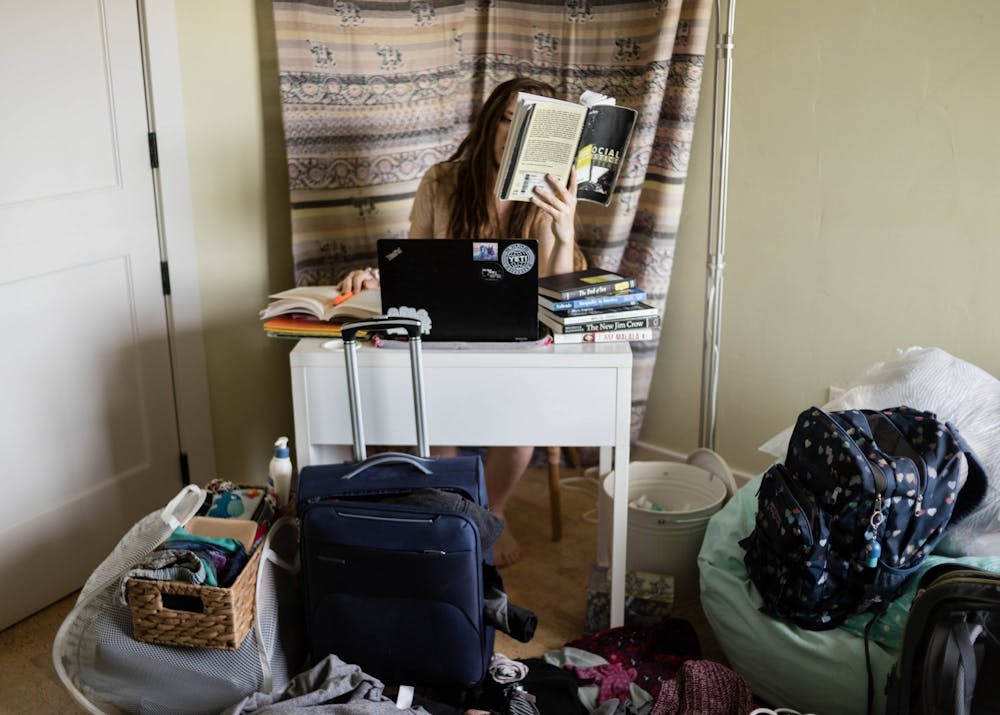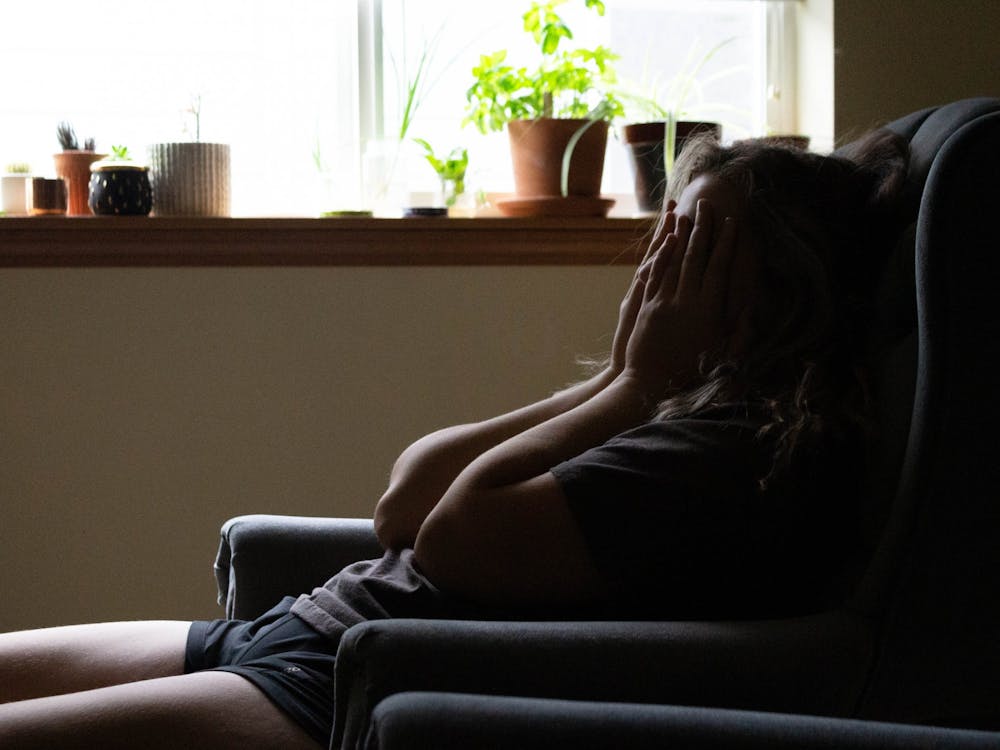In the past month, we’ve had to readjust our idea of “normal,” and we will almost certainly have a “new normal” when the COVID-19 pandemic ends. We cross to the other side of the street when we see another pedestrian on the sidewalk. Grocery shopping is now an art of trying to avoid people, touch as few things as possible and complete our trip as quickly as we can. And we struggle to believe that a mere month ago, we were getting ready for Rock the Bluff, printing our graduation announcements and posing under the cherry blossoms.
As University of Portland students, we have also navigated the transition to online classes as we confront that a pandemic rages around us. Even if our classes had continued in-person at UP, the reality that hundreds of thousands worldwide will likely die of COVID-19 would have been enough to distract many students from their coursework and weaken their academic focus.
The announcement on March 12 that the university would, in less than a week, transition to online instruction upended all students’ lives, especially those who had to leave dorms or off-campus residences to return to their houses. Many students’ study and living environments, along with their mental wellbeing, have fundamentally changed since March 12.
Because the spring 2020 semester is not comparable to a typical semester in college, the editorial board calls on professors and administrators at UP to recognize (or continue to recognize) these circumstances and show greater flexibility in the virtual classroom. We have concrete suggestions, sourced from students, for how they can accomplish this goal.
We realize that there is value in encouraging students to prioritize academics even in adverse conditions, and we understand that grades should not be the only measure of our time at UP. But for better or for worse, graduate schools and other post-UP opportunities do put a significant amount of stock in them, and it would be unfair for students to be disadvantaged in those realms because they were in college when a pandemic hit. Students could also lose scholarships over poor grades, adding to financial stress.
The Beacon knows that the administration has been in the difficult situation of encouraging professors to maintain academic standards amid the pandemic, but we also know that the Office of the Provost has given professors recent directives to be more flexible, which makes us hopeful. We commend the administration for encouraging flexibility, and we appreciate the professors who have adjusted their courses and expectations during the pandemic, such as extending deadlines and adjusting major assignments.
However, some professors have progressed with classes on the same schedule and with the same volume of work that existed pre-pandemic, embracing a “business as usual” mindset. Some have even increased the workload, based on what we’ve heard from students. We think this approach is unacceptable and believe it is a matter of equity for professors to adapt courses and show greater flexibility.
Even while students attend classes on campus, their learning conditions are not equal. Some may hold a job (or two or three), some may have student loans, and some may live with serious mental health struggles, among other circumstances. Sending students home and expecting them to study and attend class there can exacerbate these various inequities. Maintaining the same academic standards further deepens them.
Some students have not returned to ideal study environments — we have heard from students who lack reliable Wi-Fi, devices that can handle multiple virtual meetings per day, and printers, among other technological struggles. Students may also find it difficult to study and attend class at home if they have siblings who distract them or need care and if they have other responsibilities at home they may not have had while at UP. Additionally, home may be a physically unsafe or mentally taxing place for some students, depending on their relationships with their families.
Attempting class online adds another challenge, as it means students are unable to disconnect from their devices for most of the day, which can render it hard to focus. There’s a reason why so many professors have rules about putting devices away in class.
While UP generally has a reputation as a place for privileged students, that is not the case for all who attend. Seventeen million people nationwide have applied for unemployment benefits in the past three weeks, with UP students and their families among them. In addition to losing their jobs, many of them must also contend with the disappearance of their health insurance — during a pandemic. As students may struggle to pay rent and afford food, assignments may not be their highest priority.
UP students also have family members who are frontlining the battle against the coronavirus, as doctors, nurses and other hospital staff, and as essential workers in grocery stores, on farms and in distribution centers. The fear, stress and anxiety these students may have about their loved ones can impede their ability to concentrate on schoolwork. Moreover, all of these situations and the general state of the world at the moment can affect students’ mental health. A pandemic is not the typical situation for which your therapist provides you coping skills, like a break-up or failing at a job.
Students simply cannot be expected to perform the same when they are now in anything but the same environment, physically and mentally. Voicing these struggles reflects students’ maturity, not a perceived laziness or weakness. What we’re experiencing is not regular “work from home” — it’s attempting to work from home while the greater world, and our own individual worlds, fall apart.
The Beacon knows that professors are navigating many of these same challenges, are affected by the same stressors, and have generally never taught online. And we know that many professors have met these challenges effectively and recognized the burden of the current situation on students. We want to share some of the best adaptations we’ve seen in online classrooms, and we encourage professors to implement them if they haven’t already.
Make attendance optional for live classes for students in significantly different time zones. Try to find alternative ways for them to attend and participate, such as recording the lecture or asking them to complete a small assignment instead of attending class.
Communicate with students — and encourage them to communicate with you. Some professors send an email update on Sunday to provide students an overview of the week, which creates a sense of stability and also avoids multiple shorter emails throughout the week that students may miss. Additionally, remind students to attend your virtual office hours and/or encourage them to set up meetings.Some professors also ask students to email them short updates on how they’re doing, which may yield more information than simply saying, “Email me if you have a concern.” Some students may be too embarrassed to initiate that conversation.
Ask for student feedback. Students may have new suggestions or insights. Consider an anonymous and basic Google Forms questionnaire at the end of class. Simple measures like “taking the group’s temperature” by asking students to rank their stress level on a scale of 1-10 in the chat feature on Teams or Zoom can also be useful.
Be flexible on deadlines. If a student asks you for an extension, seriously consider granting it. There may be a few bad actors who aren’t honest about their reasons for an extension. But there are probably many more students for whom asking for an extension takes a lot of courage, and the pandemic may be the first time they’ve ever done so.
Do not add work. If attending class/viewing the lecture and completing the assignments take more time than they would during in-person instruction, reassess.
Adjust some assignments. Critically evaluate how well certain assignments accomplish learning outcomes and determine if they could be redesigned or perhaps even eliminated. For example, one member of the editorial board is in a class where the professor reduced a paper from 15-18 pages to 8-10, if students could accomplish learning outcomes in a shorter paper.
Modify big projects. The circumstances in which students are completing final assignments are starkly different from what we anticipated they would be, and students don’t necessarily have more time just because they’re at home. This recommendation is especially relevant for projects for which students would’ve had to conduct research on campus, volunteer or complete work at an off-campus site.
Be clear about the accommodations you’re willing to make. While it’s comforting for students to hear, “I’m here for you!” it doesn’t tell them specifically how you are available. If you’re willing to accept late work, adjust requirements for projects, or simply listen and talk to students, clearly state it.
The University of Portland claims to be committed to holistic education that centers the head, heart and hands. Adjusting course expectations and showing greater flexibility in this time of uncertainty supports these values of educating and caring for the whole person and of trying to create more equitable circumstances amid an environment that is decidedly not normal.
Have something to say about this? We’re dedicated to publishing a wide variety of viewpoints, and we’d like to hear from you. Voice your opinion in The Beacon.








